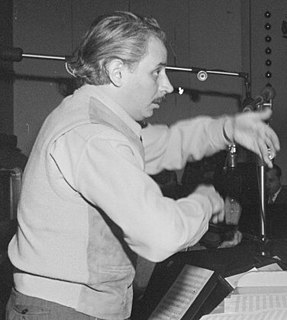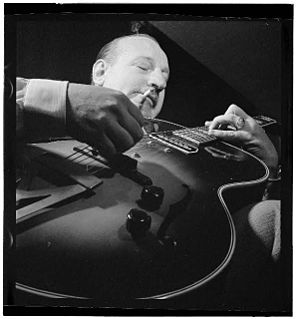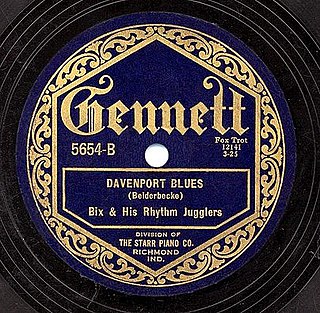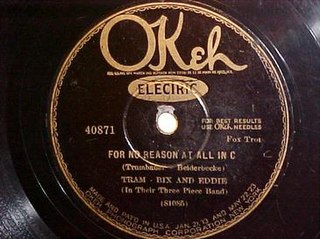
Leon Bismark "Bix" Beiderbecke was an American jazz cornetist, pianist and composer.

Hoagland Howard Carmichael was an American musician, composer, songwriter, actor and lawyer. Carmichael was one of the most successful Tin Pan Alley songwriters of the 1930s, and was among the first singer-songwriters in the age of mass media to utilize new communication technologies such as television, electronic microphones, and sound recordings.

Eddie Lang is known as the father of jazz guitar. During the 1920s, he gave the guitar a prominence it previously lacked as a solo instrument, as part of a band or orchestra, and as accompaniment for vocalists. He recorded duets with guitarists Lonnie Johnson and Carl Kress and jazz violinist Joe Venuti, and played rhythm guitar in the Paul Whiteman Orchestra and was the favoured accompanist of Bing Crosby.

Charles Ellsworth "Pee Wee" Russell, was an American jazz musician. Early in his career he played clarinet and saxophones, but he eventually focused solely on clarinet.

"Georgia on My Mind" is a 1930 song written by Hoagy Carmichael and Stuart Gorrell and first recorded that same year by Hoagy Carmichael. However, the song has been most often associated with soul singer Ray Charles, who was a native of the U.S. state of Georgia and recorded it for his 1960 album The Genius Hits the Road.

Giuseppe "Joe" Venuti was an American jazz musician and pioneer jazz violinist.
The Victor Recording Orchestra was a jazz band led by Jean Goldkette. Founded in 1924, it was considered by Rex Stewart to be the best dance band of its day and the "first original white swing band." It was known for its innovative arrangements and strong rhythm.

Orie Frank Trumbauer was one of the leading jazz saxophonists of the 1920s and 1930s. His main instrument was the C-melody saxophone, a now-uncommon instrument between an alto and tenor saxophone in size and pitch. He also played alto saxophone, bassoon, clarinet and several other instruments.
Newell "Spiegle" Willcox was a jazz trombonist. He was born Newell Lynn Willcox in upstate New York, and learned valve trombone as a youngster under the tuition of his father, Lynn Willcox, an amateur musician and bandleader. He acquired the familiar nickname Spiegle as a student at the Manlius Military Academy, where he played in the school brass band.

Leonard George Hayton was an American musician, composer, conductor and arranger. Hayton's trademark was a captain's hat, which he always wore at a rakish angle.

Young Man with a Horn is a 1938 novel by Dorothy Baker that is loosely based on the real life of jazz cornet player Bix Beiderbecke. The novel was adapted for the movie Young Man With a Horn (1950) with Kirk Douglas, Doris Day, Lauren Bacall, Juano Hernández, and real-life Bix Beiderbecke friend and collaborator Hoagy Carmichael

"Mississippi Mud" is a 1927 song written by Harry Barris, first sung by Bing Crosby as a member of Paul Whiteman's Rhythm Boys.

Carl Kress was an American jazz guitarist.
Joseph Anthony (Fud) Livingston was an American jazz clarinetist, saxophonist, arranger, and composer. He co-wrote the jazz and pop standard "I'm Thru With Love".

"Riverboat Shuffle" is a popular song composed by Hoagy Carmichael, Irving Mills, and Dick Voynow. Lyrics were later added by Carmichael and Mitchell Parish.

Davenport Blues is a 1925 song composed and recorded by Bix Beiderbecke and released as a Gennett 78. The song has become a jazz and pop standard.

"For No Reason at All in C" is a 1927 jazz instrumental by Bix Beiderbecke, Frankie Trumbauer, and Eddie Lang. The song was released as a 78 single in 1927 on Okeh Records as by "Tram, Bix and Eddie ".

Clarinet Marmalade, later Clarinet Marmalade Blues, is a 1918 dixieland jazz standard composed by Larry Shields and Henry Ragas of the Original Dixieland Jass Band. It is played in the key of F major. It was recorded by Fletcher Henderson in 1926 and Frankie Trumbauer in 1927.

"Singin' the Blues" is a 1920 jazz composition by J. Russel Robinson, Con Conrad, Sam M. Lewis, and Joe Young. It was recorded by the Original Dixieland Jass Band in 1920 as an instrumental and released as a Victor 78 as part of a medley with "Margie". The song was released with lyrics by vocalist Aileen Stanley in 1920 on Victor. In 1927, Frank Trumbauer, Bix Beiderbecke, and Eddie Lang recorded and released the song as an Okeh 78. The Trumbauer recording is considered a jazz and pop standard, greatly contributing to Frank Trumbauer and Bix Beiderbecke's reputation and influence. It is not related to the 1956 pop song "Singing the Blues" first recorded and released by Marty Robbins in 1956.

Irving "Izzy" Friedman was an American jazz reedist, best known for playing clarinet on records released by Paul Whiteman and Bix Beiderbecke in the 1920s.

















